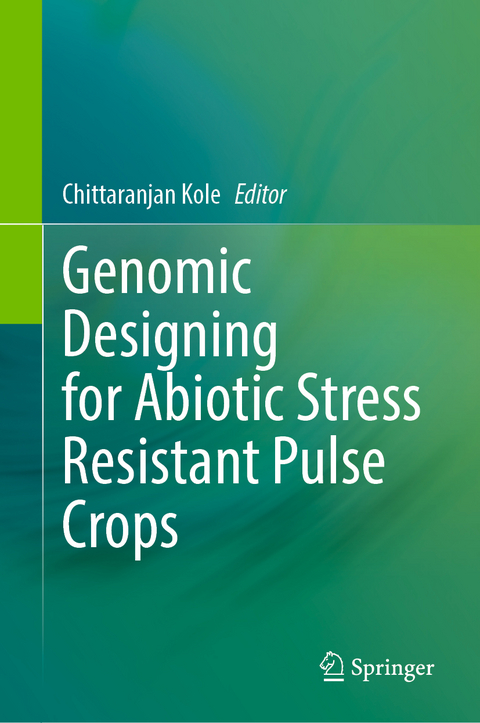
Genomic Designing for Abiotic Stress Resistant Pulse Crops
Springer International Publishing (Verlag)
978-3-030-91038-9 (ISBN)
This book presents deliberations on molecular and genomic mechanisms underlying the interactions of crop plants to the abiotic stresses caused by heat, cold, drought, flooding, submergence, salinity, acidity, etc., important to develop resistant crop varieties. Knowledge on the advanced genetic and genomic crop improvement strategies including molecular breeding, transgenics, genomic-assisted breeding, and the recently emerging genome editing for developing resistant varieties in pulse crops is imperative for addressing FHNEE (food, health, nutrition, energy, and environment) security. Whole genome sequencing of these crops followed by genotyping-by-sequencing has provided precise information regarding the genes conferring resistance useful for gene discovery, allele mining, and shuttle breeding which in turn opened up the scope for 'designing' crop genomes with resistance to abiotic stresses.
The nine chapters each dedicated to a pulse crop in this volume elucidate on different types of abiotic stresses and their effects on and interaction with the crop; enumerate on the available genetic diversity with regard to abiotic stress resistance among available cultivars; illuminate on the potential gene pools for utilization in interspecific gene transfer; present brief on classical genetics of stress resistance and traditional breeding for transferring them to their cultivated counterparts; depict the success stories of genetic engineering for developing abiotic stress-resistant crop varieties; discuss on molecular mapping of genes and QTLs underlying stress resistance and their marker-assisted introgression into elite varieties; enunciate on different genomics-aided techniques including genomic selection, allele mining, gene discovery, and gene pyramiding for developing adaptive crop varieties with higher quantity and quality of yields, and also elaborate some case studies on genome editing focusing on specific genes for generating abiotic stress-resistant crops.
Prof. Chittaranjan Kole is an internationally reputed scientist with an illustrious professional career spanning over thirty-seven years and original contributions in the fields of plant genomics and biotechnology leading to the publication of more than 150 research articles in globally leading journals. He has edited over 150 books for the leading publishers of the world including Springer Nature, Wiley-Blackwell and Taylor & Francis Group. His works and editing acumen have been appreciated by seven Nobel Laureates including Profs. Norman Borlaug, Arthur Kornberg, Werner Arber, Phillip Sharp, Günter Blobel, Lee Hartwell and Roger Kornberg. Previously he was a Visiting Professor in The Pennsylvania State University and Clemson University. He also served as the Vice-Chancellor of the BC Agricultural University in India. He is also the President and Founding Principal Coordinator of the International Climate-Resilient Crop Genomics Consortium (ICRCGC) and International Phytomedomics and Nutriomics Consortium (IPNC).
Designing Commonbean (Phaseolus Vulgaris L.)For Abiotic Stress Tolerance.- A Scintillating Journey Of Genomics In Simplifying Complex Traits And Development Of Abiotic Stress Resilient Chickpeas.- Genomic Designing for Abiotic Stress Tolerance in Pea (Pisum sativum L.).- Advanced Breeding Strategies For Abiotic Stress Tolerance In Cowpea.- Breeding For Abiotic Stress Tolerance In Lentil In Genomic Era.- Genomic Design For Abiotic Stress Resistance In Pigeonpea.- Genetic and Genomic Research for Abiotic stresses in faba bean.- Genomic Designing For Abiotic Stress Tolerance In Mungbean And Urdbean.- Genomic Designing Towards Development of Abiotic Stress Tolerant Grass Pea for Food and Nutritional Security.
| Erscheinungsdatum | 10.03.2022 |
|---|---|
| Zusatzinfo | XXV, 381 p. 31 illus., 27 illus. in color. |
| Verlagsort | Cham |
| Sprache | englisch |
| Maße | 155 x 235 mm |
| Gewicht | 769 g |
| Themenwelt | Naturwissenschaften ► Biologie ► Botanik |
| Schlagworte | abiotic stress • Crop improvement • Genome editing • genomics-assisted breeding • Molecular Breeding |
| ISBN-10 | 3-030-91038-5 / 3030910385 |
| ISBN-13 | 978-3-030-91038-9 / 9783030910389 |
| Zustand | Neuware |
| Informationen gemäß Produktsicherheitsverordnung (GPSR) | |
| Haben Sie eine Frage zum Produkt? |
aus dem Bereich


